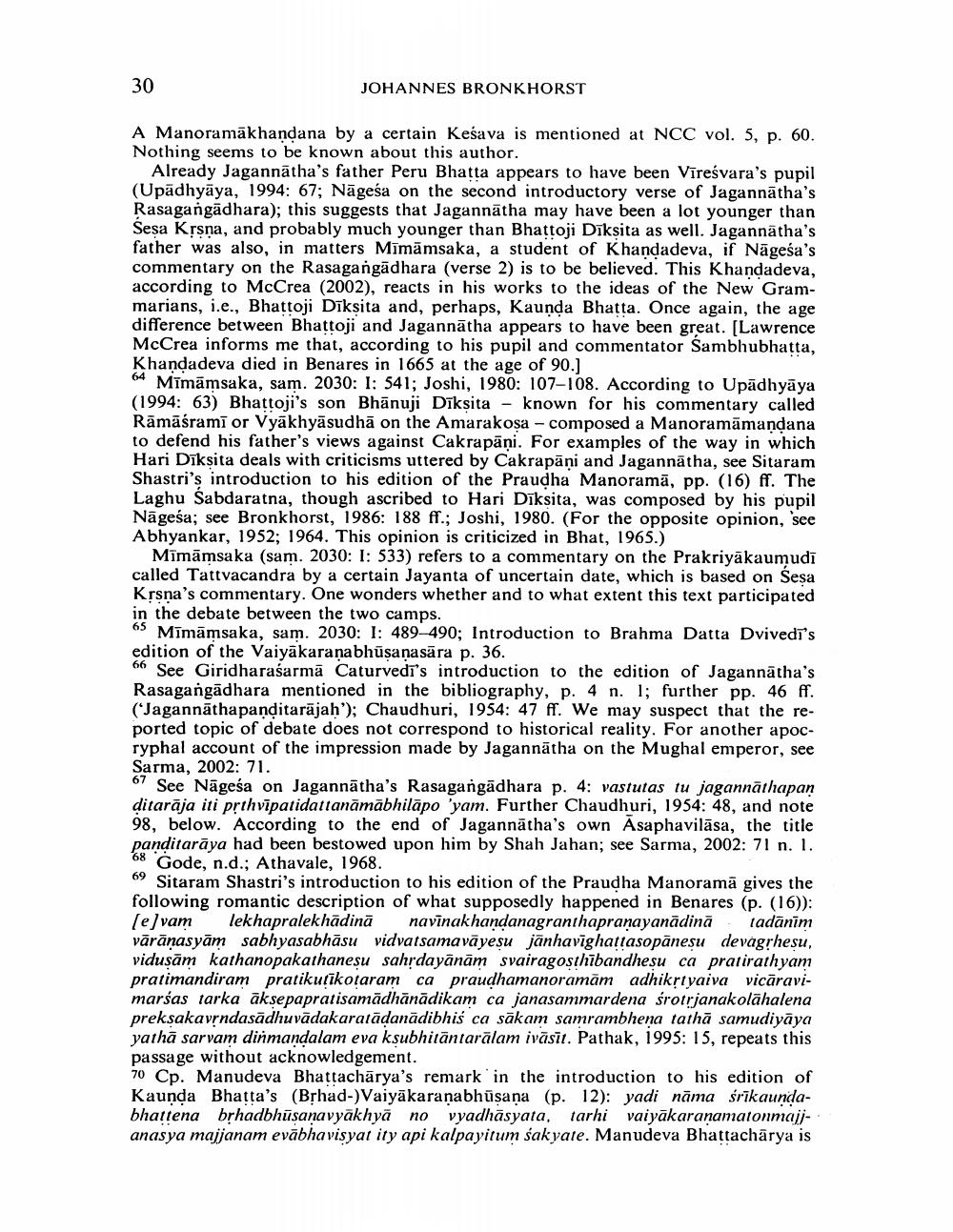________________
30
JOHANNES BRONKHORST
A Manoramākhandana by a certain Keśava is mentioned at NCC vol. 5, p. 60. Nothing seems to be known about this author.
Already Jagannātha's father Peru Bhatta appears to have been Vīreśvara's pupil (Upadhyāya, 1994: 67; Nāgesa on the second introductory verse of Jagannātha's Rasagangadhara); this suggests that Jagannatha may have been a lot younger than Sesa Krsna, and probably much younger than Bhattoji Dīksita as well. Jagannātha's father was also, in matters Mīmāmsaka, a student of Khandadeva, if Nāgesa's commentary on the Rasagangādhara (verse 2) is to be believed. This Khandadeva, according to McCrea (2002), reacts in his works to the ideas of the New Grammarians, i.e., Bhattoji Dīksita and, perhaps, Kaunda Bhatta. Once again, the age difference between Bhattoji and Jagannātha appears to have been great. [Lawrence McCrea informs me that, according to his pupil and commentator Sambhubhatta, Khandadeva died in Benares in 1665 at the age of 90.] 64 Mīmāmsaka, sam. 2030: I: 541; Joshi, 1980: 107-108. According to Upādhyāya (1994: 63) Bhattoji's son Bhānuji Dīksita - known for his commentary called Rāmāśramī or Vyākhyāsudhā on the Amarakosa - composed a Manoramämandana to defend his father's views against Cakrapāni. For examples of the way in which Hari Dīksita deals with criticisms uttered by Cakrapāni and Jagannātha, see Sitaram Shastri's introduction to his edition of the Praudha Manoramā, pp. (16) ff. The Laghu Sabdaratna, though ascribed to Hari Dīksita, was composed by his pupil Nāgesa; see Bronkhorst, 1986: 188 ff.; Joshi, 1980. (For the opposite opinion, see Abhyankar, 1952; 1964. This opinion is criticized in Bhat, 1965.)
Mīmāmsaka (sam. 2030: I: 533) refers to a commentary on the Prakriyakaumudi called Tattvacandra by a certain Jayanta of uncertain date, which is based on Sesa Krsna's commentary. One wonders whether and to what extent this text participated in the debate between the two camps. 65 Mīmāmsaka, sam. 2030: 1: 489-490; Introduction to Brahma Datta Dvivedī's edition of the Vaiyakaranabhūsanasära p. 36. 66 See Giridharaśarmā Caturvedī's introduction to the edition of Jagannātha's Rasagangādhara mentioned in the bibliography, p. 4 n. 1; further pp. 46 ff. ("Jagannāthapanditarājah'); Chaudhuri, 1954: 47 ff. We may suspect that the reported topic of debate does not correspond to historical reality. For another apocryphal account of the impression made by Jagannātha on the Mughal emperor, see Sarma, 2002: 71. 07 See Nāgesa on Jagannātha's Rasagangādhara p. 4: vastutas tu jagannāthapan ditarāja iti prthvīpatidattanāmābhilāpo 'yam. Further Chaudhuri, 1954: 48, and note 98, below. According to the end of Jagannātha's own Asaphavilāsa, the title panditarāya had been bestowed upon him by Shah Jahan; see Sarma, 2002: 71 n. 1. 68 Gode, n.d., Athavale, 1968. 69 Sitaram Shastri's introduction to his edition of the Praudha Manoramā gives the following romantic description of what supposedly happened in Benares (p. (16): (e)vam lekhapralekhādinā navīnakhandanagranthapranayanādinā tadanim vārāṇasyām sabhyasabhāsu vidvatsamavāyesu jānhavīghattasopānesu devágļhesu, vidusām kathanopakathanesu sahrdayānām svairagosthibandhesuca pratirathyam pratimandiram pratikutikotaram ca praudhamanoramām adhikrtyaiva vicāravimarśas tarka aksepapratisamādhānādikam ca janasammardena śrotrjanakolāhalena preksakavrndasādhuvādakaratādanādibhiś ca sākam samrambhena tathā samudiyāya yathā sarvam dinmandalam eva ksubhitāntarālam ivāsīt. Pathak, 1995: 15, repeats this passage without acknowledgement. 70 Cp. Manudeva Bhattacharya's remark in the introduction to his edition of Kaunda Bhatta's (Bșhad-) Vaiyākaranabhūsana (p. 12): yadi nāma śrīkaundabhattena bịhadbhūsanavyākhyā no vyadhāsyata, tarhi vaiyakaranamatonmajianasya majjanam evābhavisyat ity api kalpayitum sakyate. Manudeva Bhattachārya is




